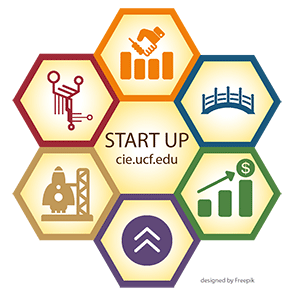Startups, Start Here: Launching a Tech Company Based on University Research
January 13, 2016
At the end of last year, our special blog series, From Idea to Marketplace, focused on the licensing process at UCF. We are starting 2016 with a new biweekly series, Startups, Start Here, which will explore the entrepreneurial resources available at UCF, specifically for startup companies licensing university technology.
Here’s a list of what we’ll be covering in this series in the coming weeks:
- We will highlight some startup-friendly technologies available for licensing through the Office of Technology Transfer.
- Through this month’s Faculty Feature, we have already introduced one faculty member with experience in creating startups at UCF. We will feature additional success stories of companies that were started by faculty, students, and alumni with UCF technology and utilizing UCF resources.
- Our sister group, the Venture Accelerator Lab, will discuss subjects such as accelerators, Small Business Innovation Research (SBIR) funding, commercialization grants, and angel funding.
- We will present other groups and services aimed at assisting startups such as I-CORPS, Blackstone Launchpad, the Florida Institute for the Commercialization of Public Research, and the Florida High Tech Corridor.
—
Last month, the Bayh-Dole Act celebrated its 35th anniversary. Before this legislation, the federal government owned the rights to the intellectual property created as a result of research funded with federal dollars. The Bayh-Dole Act enabled universities to retain ownership of inventions arising from federally funded research and to facilitate commercialization of these inventions through licensing agreements with the private sector. The universities took on the responsibility of examining the commercial impact of new intellectual property and ensuring that innovations moved from the lab to the marketplace, so they could make a positive impact on our everyday lives. Since then, technology transfer offices blossomed across the country, and can be found in over 230 academic institutions. More and more universities are invested in the process of protecting and commercializing inventions created on their campuses.
Although there is a growing trend in conducting applied research with defined commercialization plans, traditionally, federal research dollars (e.g., funding from organizations such as the National Science Foundation and the National Institute of Health) were primarily awarded for basic research—to expand our knowledge of science and technology. Thus most of the discoveries that will come through a university technology transfer office are quite nascent for the marketplace.
This is why university startups are important. They can help to develop and then sell the technology, which may eventually become acquired by a larger company who can incorporate the new technology into existing products or processes or create a new product line.
—
A university startup is a little different from some of the startups you’re more familiar with, such as Uber, Airbnb, Tinder, PillPack, and YikYak, with one very notable exception of Google, which began as a result of research at Stanford University. The key difference between an industry startup and a university startup is that the former typically begins with solving a problem in the marketplace (a cheaper or more efficient way to do x). The latter starts with an idea based on research results and then looks to identify applications of the idea and what problems it could solve. Technology transfer offices in universities must examine the viability of these ideas in the marketplace. Put simply, although it may work in the lab, it could be too expensive or cumbersome to make into a product to be sold.
What’s similar between the two types of startups is the culture: it’s intense and requires a lot of time and effort up front to get the innovation to a more marketable, practical place. As America’s Partnership University™, UCF provides a variety of resources and services to faculty and students to support them in their entrepreneurial endeavors. You’ll learn more about them in the coming weeks and months.
—
If you want to learn more about how the Office of Technology Transfer can help you bridge your invention from an idea to the marketplace, contact us and let’s start a conversation.
